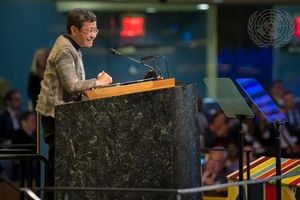On September 23, 2025, pop superstar Dua Lipa and her talent agency William Morris Endeavor (WME) found themselves at the center of a swirling media storm, battling reports that she had fired her longtime agent, David Levy, over his alleged involvement in a campaign to remove the Irish rap group Kneecap from the Glastonbury 2025 festival lineup. The controversy, which quickly spread across British and international media, has exposed deep divisions in the music industry over the Israel-Palestine conflict, as well as the speed with which rumors can ignite online outrage and confusion.
According to The Daily Mail, the singer, currently on the North American leg of her ‘Radical Optimism’ world tour, had parted ways with Levy, allegedly due to his political stance on Israel and Palestine. The tabloid cited unnamed industry sources claiming, “Dua made sure through her people that David Levy wasn’t working on her music anymore. She is very openly pro-Palestine and that doesn’t align with David.” The report further suggested that Levy’s signature on a letter urging Glastonbury organizers to drop Kneecap—an Irish group known for its outspoken pro-Palestinian views—was the final straw. The letter, intended to be confidential but leaked by a Glastonbury employee, called on festival co-creator Michael Eavis to remove Kneecap due to their political activism. Despite the campaign, Kneecap performed at the festival as planned.
But within hours of the story’s publication, both Dua Lipa and WME issued firm denials, seeking to set the record straight. Lipa took to Instagram to address her millions of followers directly, writing, “I do not condone the actions of David Levy or other music executives toward an artist speaking their truth. I also cannot ignore how this has been handled in the press. Not only was the story completely false, but the language used has been deliberately inflammatory, crafted purely for clickbait.” She continued, “It is always Free Palestine but exploiting a global tragedy in order to sell newspapers is something I find deeply troubling.”
Her agency echoed these sentiments. In a statement to NME and other outlets, a WME spokesperson stated, “Reports suggesting that Dua Lipa or her management dismissed one of our agents because of his political views are categorically false.” They clarified that David Levy “played a role in Dua’s early career (2016-2019) and as is customary, is credited both internally and in industry journals as being a member of the team. When he moved out of London in 2019, he transitioned into an advisory role and has not been involved in Dua’s day-to-day business since. Levy fully removed himself from the project among others earlier this year.”
This was not the first time Dua Lipa’s political views have put her in the headlines. The Grammy-winning artist has been outspoken in her support for Palestine for several years. In 2021, she criticized a New York Times advertisement that labeled her and models Bella and Gigi Hadid (both half-Palestinian) as antisemitic. More recently, in October 2023, she was one of many celebrities to sign a letter to then-US President Joe Biden, calling for a ceasefire in Gaza. She reaffirmed her stance in a January 2024 interview and, in May 2025, publicly supported the #AllEyesOnRafah campaign, urging solidarity with people in Rafah’s refugee camps, writing on Instagram, “Burning children alive can never be justified. The whole world is mobilising to stop the Israeli genocide. Please show your solidarity with Gaza. #AllEyesOnRafah.”
Lipa has not shied away from controversy, even when it meant facing backlash. She told NME in June 2025 that she was “willing to be met with a backlash” over her comments, describing her activism as “for the greater good.” She also joined over 300 public figures in signing Choose Love’s open letter urging UK Prime Minister Sir Keir Starmer to “end the UK’s complicity in the horrors in Gaza,” a call that was met with a tepid response from the government and further criticism from non-governmental organizations demanding concrete action.
The letter at the heart of the latest controversy was reportedly signed by 30 influential music industry figures. DJ Toddla T, a prominent critic of the campaign, wrote on Instagram that it “was headed by a very systemically powerful music agent and signed by 30 individuals from within the music industry.” The leak of the letter and the ensuing uproar highlight the increasing pressure on artists and executives to take public stands on geopolitical issues—sometimes at the risk of career-altering consequences.
For his part, David Levy has not commented publicly on the matter. According to statements from WME, his involvement with Dua Lipa’s career had already diminished significantly by 2019, when he relocated from London and transitioned into an advisory capacity. By early 2025, he had fully removed himself from Lipa’s projects. Still, the perception that Lipa had acted in response to Levy’s political actions proved difficult to shake, even in the face of categorical denials.
The broader context of the story is a music industry increasingly divided over the Israel-Palestine conflict. As reported by The Times of Israel, a number of British acts—including Massive Attack, Björk, and Kneecap themselves—have joined initiatives to block their music from being streamed in Israel, in solidarity with Palestinians. Massive Attack, in a recent Instagram post, urged artists to “transfer their sadness, anger and artistic contributions into a coherent, reasonable and vital action to end the unspeakable hell being visited upon the Palestinians hour after hour.”
Kneecap, meanwhile, has faced its own share of controversy. The group’s singer is currently facing terrorism charges in the UK for allegedly displaying a Hezbollah flag at a concert, leading to a ban from Canada and the cancellation of a sold-out US tour. Despite these hurdles, their performance at Glastonbury 2025 went ahead as scheduled—a testament to both the group’s resilience and the festival’s commitment to artistic freedom, even in the face of intense political pressure.
The episode also underscores the power—and peril—of media narratives in the digital age. Lipa’s statement called out what she saw as “deliberately inflammatory” language used by The Daily Mail and other outlets, accusing them of exploiting global tragedies for clicks and fueling online division. The rapid spread of the story, and the difficulty in correcting the record even after official denials, is a reminder of how quickly misinformation can shape public perception, especially when it intersects with charged political issues.
As the dust settles, Dua Lipa remains steadfast in her activism and her refusal to let tabloid speculation define her. The singer continues to use her considerable platform to call for a ceasefire in Gaza and humanitarian support for Palestinians, undeterred by controversy or backlash. For fans and observers alike, the episode is a vivid illustration of the complicated intersection of celebrity, politics, and media in 2025—a world where every action, every word, and every rumor can become a flashpoint.
In the end, the facts remain: Dua Lipa did not dismiss her agent because of his political views, as both she and her agency have made clear. But the debate over music, activism, and the Israel-Palestine conflict shows no signs of fading from the spotlight anytime soon.




